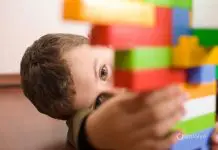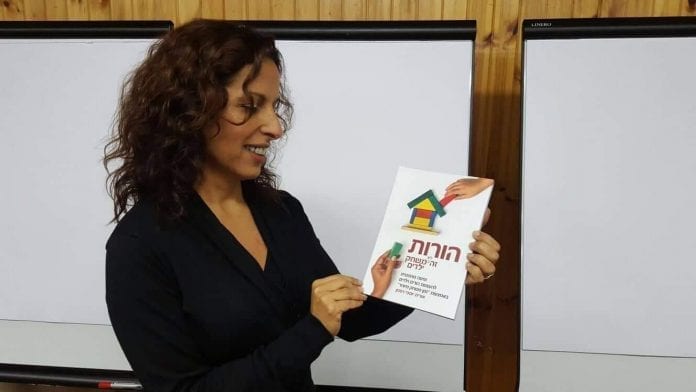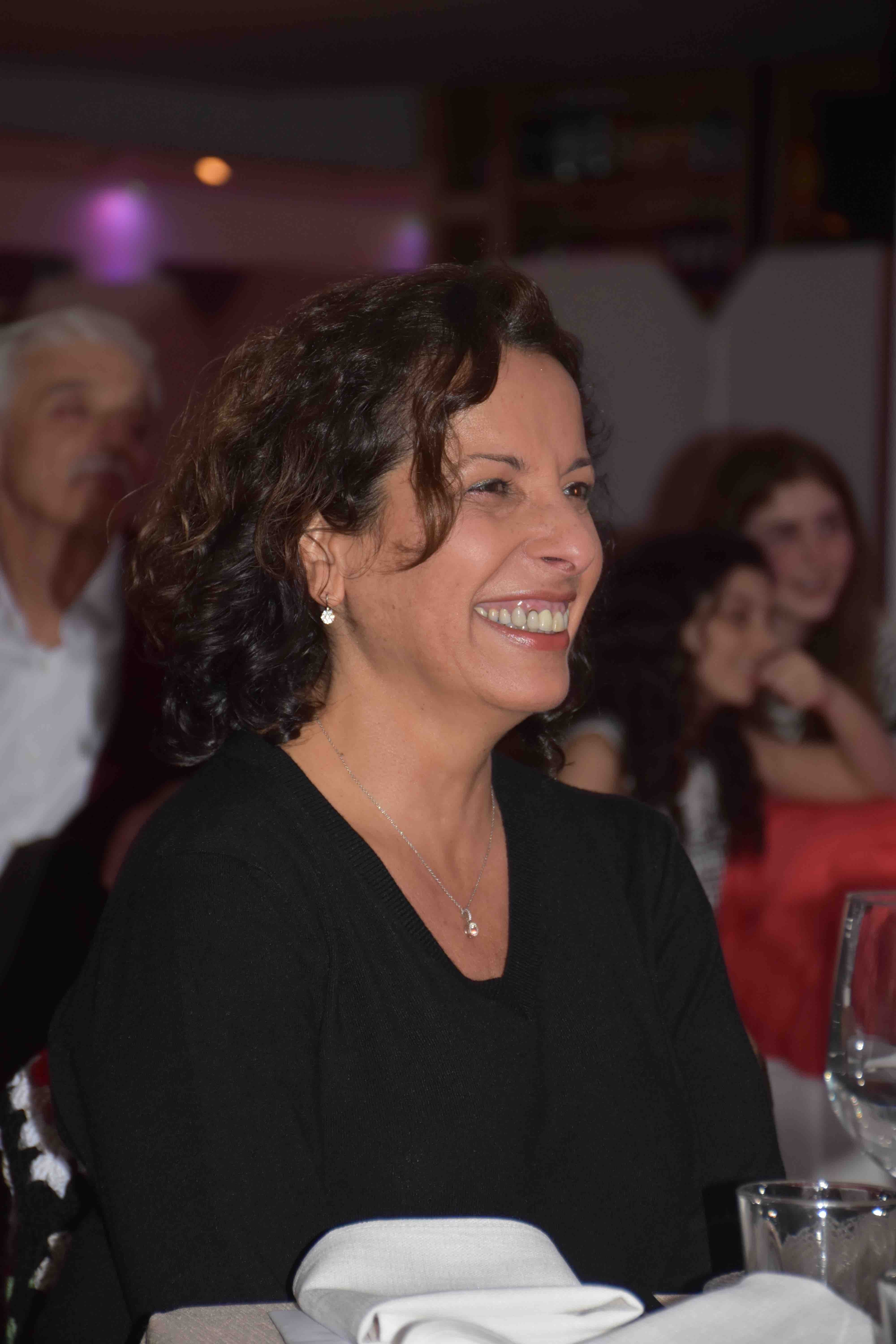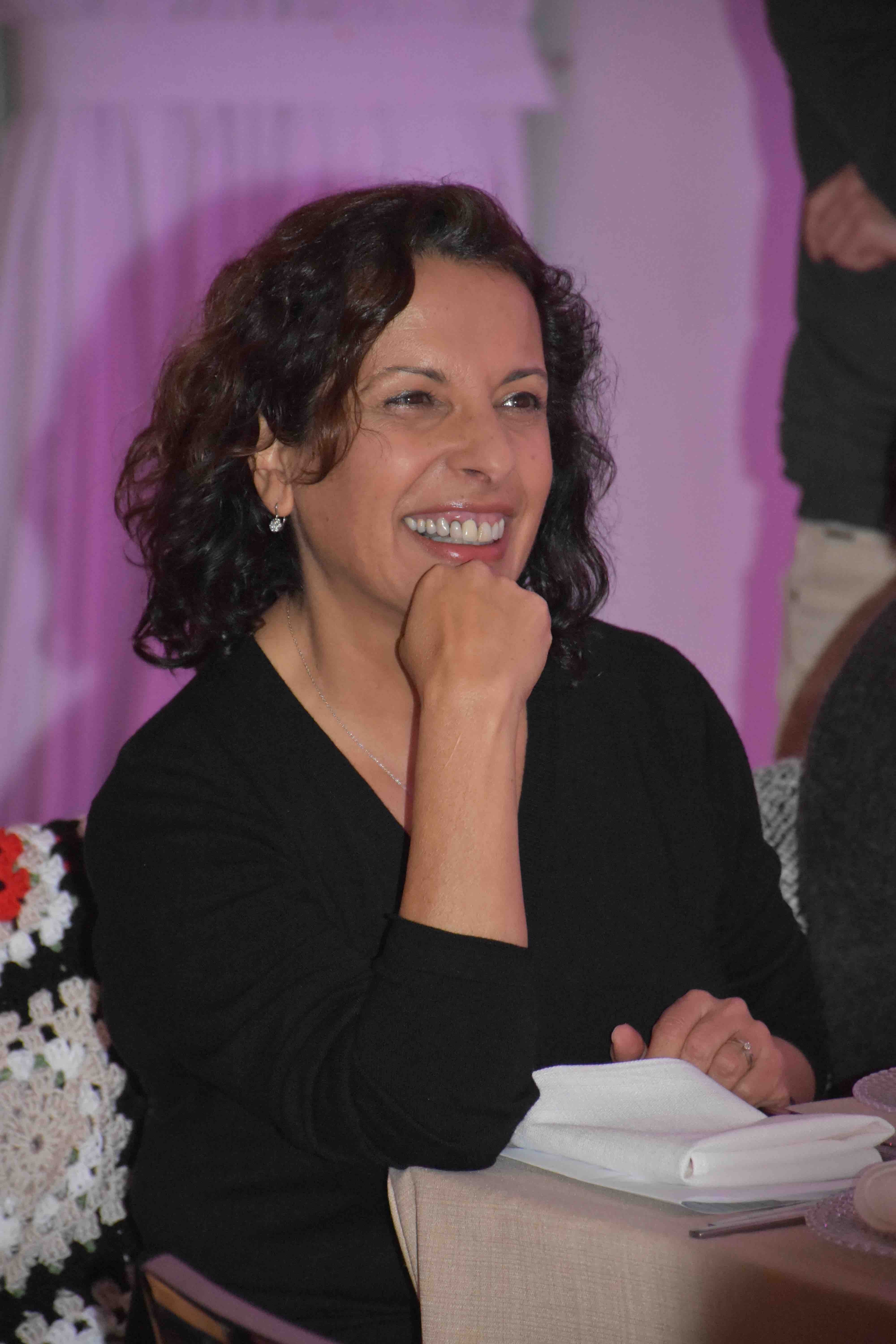Orit Josefi Wiseman is an acclaimed child therapist who gained her Masters degree at York University 20 years ago.
Since then, she has dedicated her life to improving children’s wellbeing and supporting families in creating a safe and pleasurable environment for them all.
Her clinic is based in Israel. There, she runs workshops for families, with the intention of
improving communication within the family and strengthening the inner sturdiness of children.
Furthermore, Orit delivers her courses to education and child wellbeing teams worldwide,
guiding and teaching them skills relevant to their work with children. Most recently, Orit gave lectures on Active Listening for parents of children in Aylin Kotil School in Istanbul.
In 2018, her book “Parenting Is (Not) Child’s Play” was translated from Hebrew and published in Turkey. Orit is frequently invited to lecture to parents. Recently, she started delivering a series of lectures on parenting in Istanbul.
The first one was about ‘Parenting Styles and the Setting of Boundaries to reestablish parental authority. The upcoming lectures are entitled “New challenges for parents in the era of screens”, “Parenting a Teenager”, “The Power of Praise: Changing the behaviour and the role of the child in the family through Praise”, and finally “Sibling Rivalry”.
In addition to being a child therapist, Orit is an accomplished trainer and life coach and has
worked with thousands of men, women and children, in supporting and guiding them to
improving the quality of their lives.
*
I’m delighted to introduce Orit Josefi Wiseman to you.
The day I had an appointment with her for this interview, after her fascinating answers, I participated in her ‘Setting Boundaries and Reclaiming Parental Authority Amiably’ lecture. I must share this with you; the lecture series Orit delivers is (not) only about parenting and wellbeing of children. The lecture also reveals we all carry some influences from our childhood in our adult minds and behavior.
You know sometimes we say to ourselves or the ones around us, ‘I was surprised myself! It just happened.’, and sometimes we see that the people we communicate with are stuck somewhere that there seems to be no way to move. Even if we want to understand the situation and person and be understood, after some trials we feel there is nothing left to do.
Though, there always is.
*
You can get Orit Josefi Wiseman’s latest book Parenting is (Not) Child’s Play from all D&Rs.
Let’s start! Enjoy reading:)
*
I’d like to start from the name of the book. As a writer, what led you to pick this name?
In English it has double meaning. On the one hand, when you say that something is not ‘child’s play’’ it means it is not easy and indeed, I believe parenting today is very complex and challenging for parents. On the other hand, this book shows parents that they can help their children through special child play. That is why I picked this name for my book.
These days a lot of parents feel lost, not sure about the right way to parent their children. In the past, 50-60 years ago, life was very clear. There was a pyramid, normally the father or mother were at the top, the children were at the bottom. When children didn’t behave, the mother used to say ‘Wait until your father comes home.’ These days, parents are more aware of the effect they have on their children’s psyche and so, they want to change and treat their children differently to the way they were brought up. They moved from the pyramid structure to putting their children and their needs in the center obliging to give them whatever they want. Unfortunately, this doesn’t work either! So today, many parents are confused and lost and find parenting difficult and definitely not ‘child’s play’.
Do you think there is a specific time for a couple to become parents?
Well! I think it’s very important first for the couple to settle into being a couple, because when you get married, you need to get used to the other person. As it is a long term commitment, you need to make some adjustments to your lifestyle and attitudes. Therefore, I think people need to first settle into being together before they bring another person in, because that little person is going to press all their buttons! So they need to have a solid base first.
Children are full of love, joyful, free… until they start growing up. What do parents need to provide for them to remain this way?
Parents need to create a very secure environment and by saying secure environment I mean also to set boundaries. Often, parents think that if they set boundaries, they might make the child feel less loved, but in truth, it’s just the opposite!
When we set boundaries, it doesn’t have to be a fight. When we set boundaries, we need to have a clarity of what we want to achieve. When we have clarity of right and wrong we can set boundaries while still listening to the children, showing them love. This combination of expressing love and setting boundaries makes the child feel very safe, because he then feels that there is an adult who knows what he is doing, he is not afraid of the child’s crying, and is capable of saying enough, no more. This gives them a sense of security which is vital for children’s mental health. So the secret is to listen to the children, show them love and set boundaries. Most parents do either this or that. They seldom do both!
Is it possible for us to set boundaries without damaging a child’s self-esteem? When we set a boundary, some children might push or go against that limit. How can we be certain that we are right in setting that specific boundary?
First of all, most parents do not think ahead about the boundaries they want to set and how to go about it. Most parents just react. Reacting does not allow the child to learn anything. Because when I react, I react from anger. The only thing the child sees is anger and learn nothing from it.
Now, setting boundaries is something totally different. They parent is in control’ he is not fighting the child. On the contrary, he tells the child, I understand your feelings and what you want but this is the limit for now and then he helps the child find an alternative for his behaviour. Often, when children oppose their parents, the parents take it personally and feel offended, as if the child is being ungrateful and behaving like this with the intention to irritate them on purpose. That’s not the case!
Children have their own needs to play and to live in the moment. Parents, on the other hand, have a very difficult job of raising a child who will know how to behave in society. So obviously, they have different needs. Parents have their needs to educate the children and children have their needs to live spontaneously in the moment.
So children are objecting to boundaries not because they don’t respect their parents, but rather because they are trying to meet their needs for play. Because parents, many times, take it personally, they lose their control and sight of what they want to achieve and they simply react with anger.
From which month or what age, we should start setting boundaries?
As soon as children start talking, it is time to start setting boundaries according to the age of the child. Sometimes I hear from parents who are worried that they might spoil their 6-months-old child if they pick him up every time he cries. On the contrary. At this age, the ideal situation is to have the baby close to the parent’s body as much as possible. There was a research in a tribe in Africa where children grow up very capable and balanced. They observed that there, the mothers carry their babies tied to their bodies from the moment they are born and carry on with their day-to-day life. They harvest the field, cook and work with the baby tied to them until he is old enough and shows his wish to get down and start walking. Then they are so free, they learn a lot about life just being on the parent all the time. In the western world we forgot the natural way of bringing up children and so we are afraid to even pick up the baby when he cries in case we spoil them.
Babies should receive the basic needs. They should be fed, given love and warmth, be touched. That’s what they need until they learn language.
From what age a human being is not called a child anymore?
This is not a mathematical equation. Human beings are not one minute a child and the next minute an adult. However, from around the age of 12-13, the whole attitude of parents should transformed a little. Their children are not adults yet, but they are not young children either. It is time for parents to include them in discussions, let their voice be heard, Listen to them with open mind. If not, they might feel not understood, not respected and as a result they will refrain sharing anything with us or listening respectfully to us. If we want to be included in their lives, we need to include them in our decisions. It doesn’t mean we cave into what they want, but we need to discuss and negotiate things with them. This is a part of the development of children to become independent adults.
In your book, you explain the attitude of ’I am here. I listen to you. I understand you. I care about you’, that parents should adopt during ‘Special Play Time’. What is the meaning of these sentences for children?
When you look at parents, many times they are not present. Even when they are physically there, they are not listening. If they are not listening, they do not understand. So the child concludes that they probably also do not care.
If you look at restaurants, you will see families sitting around a table, each member of the family busy with their own phone. Often children are given a phone to play a game because he is bored and the parent does not feel like making an effort to play with him. In other words, these days, phones are a cheap and dangerous babysitter! So even if the parents are there, they are not there.
Children need to have some time where they experience their parents with the attitude ’I am here. I listen to you. I understand you. I care about you’, particularly at this time and age where they hardly have that. We need to create a space where the parents are disciplined and put their precious child in the center of their attention.
In ‘Special Play Time’ they have an opportunity to do so for 40 minutes. Even that seems hard for parents because it means they need to leave their phone outside the room allowing absolutely no distractions whatsoever to their special time with their child.
How can parents see clearly and objectively the right way to raise a healthy and balanced child? It seems a little hard.
It’s just a matter of practice. That is why I am suggesting to be focused on the skills I am teaching in the book for only 40 minutes a week. I am not saying do it all day long. But in those 40 minutes, parents focus on the way the child is playing, describing what they see the child is doing, without opinion or judgement, they set very few limits in a special way and they rediscover their child and themselves as parents. In those 40 minutes parents are given an opportunity to be with their child without offering their ideas, educating the child, preaching him or telling him off. This way, for 40 minutes, the child experiences understanding and care from his parent. It is very special for the child because when we are educating him, preaching to him, or judging him, he does not feel cared for! Even though parents do all this from love and care for their child, all he experiences is criticism.
24 hours times 7 we need to be the educator of our children. It is many many many hours. We can balance it with 40 minutes a week of very different time!
How long this specific play should last? Till adulthood?
(Smiles.) Children tell us when they have had enough, when they don’t want it anymore. Sometimes, after doing it for a while, we need to shift it. If for example, after 8 or 10 times of special play a child says, ’Let’s not have a play time anymore’, we can offer a different way of having quality time together. We might change the conditions or the activity or the place according to what the child wishes, but we won’t change our attitude during that time. We will still let the child lead the way. He might choose for us to cook together, go for a walk or something totally different.
Children can be both sweet and angelic and challenging. This might confuse parents with regards to how they should be. What is your advice for them?
If parents think about what makes them mad in their daily routine, they will notice that, actually, there are only between 5 to 10 scenarios that keep repeating in their daily life with their children.
It can be useful for them to prepare a D.U.R. statement for each of those situations so that they are ready when it happens again in their home and clear how they want to handle it. They need to plan what exactly they are going to say at that moment, what needs and wants of the child are there to acknowledge, how they are going to state the boundary and which alternative behaviour they can suggest to their child.
This way, next time this situation happens, and it will happen (Smiles.), instead of reacting with anger, the parent will be ready and feel in control of the situation. Parents often get angry, because they feel helpless. They don’t know what to do. When they are prepared and know what to do, it can become much easier for them to manage the situation.
Actually, with the Special Play Time you explain in your book, you offer parents an opportunity to understand their child deeply and to take a calming breath if they have a challenging one. Is there a specific power under this game to shape children’s future? Or do I expect too much from it?
Of course. I even wrote it in the book. Children today are very clever, really clear, and parents promote that. They know everything. They even know their rights… However, emotionally and socially they are under developed. They are infantile. There is a huge gap in their development which is going to affect their adult lives negatively!
A long time ago, children developed emotionally and socially through spontaneous play with other children. If you look at children today, they go to school, then maybe have special classes and if they don’t have homework they spend the rest of their time in front of screens, such as, TV, computer, İpad, İphone, etc. The time that is so important to use in practising social, emotional skills, like taking turns, getting angry and making peace with friends, etc., is wasted on screens, which is a big problem!
So now we need to create a new way, a different way to develop children emotionally and socially so that they grow to become balanced adults. Clever and intelligent, yes; but also, emotionally intelligent.
Children take many lessons after the school; piano, guitar, chess, mathematics, language and so on. It’s so common among parents these days to hire a tutor and to have their children taken a lesson after a lesson…
They are all lessons about learning skills. They are not about emotional skills, not about social skills. It’s totally different if they invite friends over and engage in spontaneous play, excuding computer games or TV. Think about it. When do they do that? Hardly ever!
Some families send their children to play schools, like my 2-year-old nephew Mahir Hasan.
Yes. At the age of 2, we take them to play with other children until they are 4 or 5 and then it is finished. They need to be playing spontaneously with other children until the age of 10-12. What about those 7 years? Parents of young children are not aware enough of the importance of play for their children’s development. Only when the children grow up do parents realise that something is wrong. They notice that either their child is very introvert and prefers to spend most of his time in front of the computer, or they do not know how to talk to other people, How to handle frustrating situations, how to create relationships etc etc. It’s a huge problem!
Must the person be the parent who gives the child the 40 minutes special play time?
The most important people in the child’s life are the parents, not the nanny or the grandparents. As it is only 40 minutes per week it is important that the parents make an effort to provide it to their child and to themselves, as it is a good opportunity for them to practice new parenting skills.
Do you have any suggestions for the parents who have an only child?
Often those children are treated as princes or princesses. The parents give them everything they want and often do not set boundaries. When you set a boundary, the child needs to overcome disappointment and frustration, which is a vital skill he will need in his adult life. He needs to experience occasions when his needs will not be met to see that they can handle it. Often, only children in families are not given enough boundaries and therefore do not learn important social skills. Also, it will be good if parents of single children often invite their child’s friends to their home to play with their child so that they have more opportunities for spontaneous play, free play.
By saying spontaneous play, what kind of play do you mean?
Children learn the most from spontaneous play. They use play to process what they are going through emotionally. If they have a new born sibling, you can see them suddenly playing a lots with a baby doll. That’s their way to process the new circumstances in their life. They also learn social skills through free play. Let’s say, a girl invites a friend over and suggests ‘Let’s play queen and king.’ The other child rejects the idea, ‘No! I wanna play with cars.’ They need to negotiate and eventually find a solution to their disagreement, ‘Let’s play king and queen and then we will change to cars.’ The other says ‘Great! Now, who is gonna be the queen and the king? I want to be the queen…’ and immediately, they have another situation to deal with, and that is how they develop their social and emotional skills.
Games that have an aim and a purpose are not part of spontaneous play. For example, puzzles are aimed to increase some abilities in children. Of course, it is important to develop the thinking of a child/ Often we do not realize that there is something that even more important, which is developing the emotionally and socially skills of children.
Many families experience problems between siblings. All over the world there are examples of children behaving violently with their siblings.
This issue requires a long answer. I have a whole lecture about it. I will just say one thing. Between siblings there is often jealousy. This is the reality in many families. The way parents handle it will either makes the fire of jealousy bigger or smaller. For example, often parents feel that they need to protect the young child from his older sibling. Those young children know that and therefore use it to manipulate the situation and receive extra attention from their parents and get their older child to lose in this fight of attention. The parents then create more frustration in the offer child and without realizing they increase the fire of jealousy between their children.
Is there really something called terrible twos?
Around the age of 2, Children discover for the first time their own will. They want to practise that which is great! We should not break their will, but also we should set boundaries so that the child feels that there is a strong adult there who can take care of him even when he is using his crying and misbehavior to manipulate and test the parent. The parent needs to remain strong with empathy to pass the test, because if not, both the parent and the child will suffer for a long time. D.U.R. statement, as explained in the book, is the right way forward!
Almost every other child is being brought up by nannies or babysitter, especially in cities like İstanbul. For parents, spending quality time with their children is getting harder and harder each day.
That’s why I said times are difficult for parents. They are working long hours and when they return home, they are tired. But then, they need to start their second ‘job’ with their children. They probably have only a couple of hours a day with their children and therefore they need to get it right in that short time. Special play time skills can support them with that.
Nowadays there are cameras at homes. We can watch how our children is treated. What about if there are some words nannies use that we find wrong? Does it have any negative effect on young children? Babies do not understand words yet. Do the things they don’t understand yet have any effect on their subconscious mind?
Of course! The bad words and the attitude behind them, are affecting children very much. Children are super sensitive. They know intuitively when they are loved and when they are not. They feel everything. They do not need the words.
What is the description of best parental language?
To say ‘I love you’ and express it and when they are disappointed to say ‘I am disappointed’ without shouting. The parents need to understand that they set an example to the children and those children will be shaped according to their behaviour.
How about saying whenever possible ‘I love you.’ or ‘Well done!’, ‘Bravo to my daughter/son!’, ‘You are super.’?
“I love you” is great. “well done” is good. But superlatives, such as, ‘you are a clever boy’, ‘you are a good girl’, ‘you are a beautiful girl’, are all damaging. ‘Oh you are such a genius, you are genius, what a genius.. there is nobody like you.’ or ‘You are the prettiest girl ever ever ever!’ Saying those things are affecting children negatively.
They are like labels which turn into the child’s prison. Even though the parent’s intention is good, those superlatives hide expectation for the child to always be that way. Instead of empowering children, these statements pull them down with the heaviness of the expectations, fearing that they eventually will disappoint the parent because they do not think they are that clever, beautiful, etc.
Once they are labeled as ‘genius’, for example, they are frightened to make any mistake for people to discover that they are not that clever and so they choose to remain in their comfort zone! ‘They will discover the truth that I am not that genius as somebody in my class knew the answer and I didn’t. So I need to protect myself all the time.’ And so the child is in the prison of ‘being a genius’.
The same with ‘You are the prettiest or the most handsome.’ It’s too much, too much for them. Those labels are damaging. Of course, the negative labels are damaging just as much.
How can the parents who would like to participate in your lectures or who would love to take a private session for their children reach you?
They can call Butik Publishing 0 212 612 05 00 or e-mail Birol Gündoğdu birol@butikyayincilik.com and reach me from oritjw@gmail.com .
Has been another great interview. I am so lucky! Thank you.
Thank you.




















































